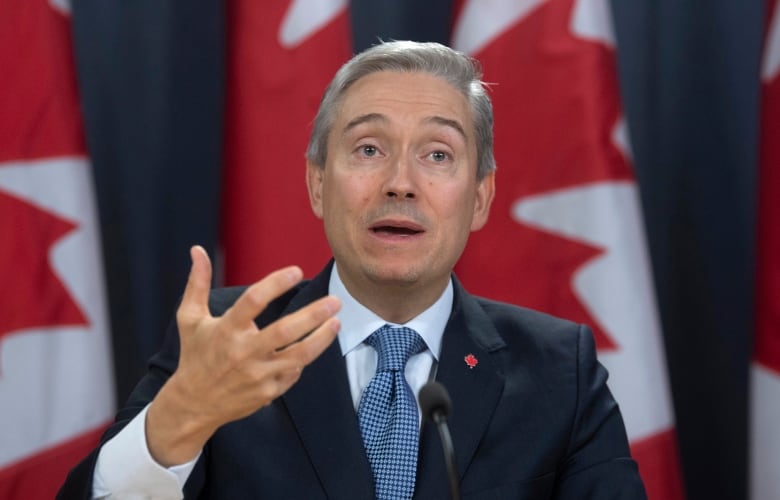The Prime Minister's Office is adopting a new approach to managing its most-important economic, security and bilateral relationship, according to two sources with direct knowledge of the situation.
More ministers will now be dealing directly with their U.S. counterparts as Ottawa takes a step back from its rigidly controlled approach to dealing with the Trump administration.
Deputy Prime Minister and now Finance Minister Chrystia Freeland had been the country's point person on all things U.S. after leading the re-negotiation of NAFTA.
As she takes on her new role in Ottawa, additional ministers will be taking over some of her responsibilities, according to the sources.
The sources say Trade Minister Mary Ng will be dealing with her counterpart, U.S. Trade Representative Robert Lighthizer.
Foreign Affairs Minister François-Philippe Champagne will also now be dealing with his equal, Secretary of State Mike Pompeo.
Public Safety Minister Bill Blair, who has taken a lead role in negotiating the terms of COVID-19 border restrictions, will also take on some added responsibilities.

Warned to keep out of election
The players may be changing, but the sources say the priorities remain the same. Maintaining a strong economic and security relationship is at the top of the list. Making sure not to inadvertently upset President Donald Trump is also a concern.
One source says the ministers have been directly warned to stay out of the U.S. election.
This warning echoes one made back in 2016 by former Canadian ambassador to the U.S. David MacNaughton. In the run-up to that election, he warned cabinet ministers not to say anything about then candidate Trump, who trailed in the polls at the time.
At a cabinet retreat, he told ministers that Trump had a shot at winning, and his temper should not be underestimated.
The sources say Canada is now in a position to embrace a more traditional approach to its relationship with the U.S. after a difficult three and a half years with the Trump administration.
NAFTA negotiations heated and rocky
Freeland and a small circle in the Prime Minister's Office were first given the Canada-U.S. portfolio in the tumultuous weeks following the 2016 election.
The election of a populist president who had promised to amend or abolish Canada's most-vital trade agreement, NAFTA, prompted an emergency cabinet shuffle in Ottawa.
Freeland was given what she'd previously viewed as a dream job: minister of foreign affairs. And with it came a more unusual assignment for a foreign minister: overseeing trade issues and major files impacting the bilateral relationship with the United States.

That assignment produced memorable, rocky moments.
The NAFTA renegotiations were often heated. Freeland's interlocutor, Lighthizer, complained about the Canadian negotiating style and the frequent leaks to media about details of the talks.
Freeland, for her part, made clear her disdain for the Trump administration's view of international relations in general and trade in particular.
She gave Lighthizer books with lessons on the devastating history of nationalism and protectionism and on the idea that this is the greatest period in human history thanks to global interconnectedness.
She gave speeches in Washington and in Ottawa decrying the Trump team as a threat to the rules-based international order.
It won her plaudits and even an award from like-minded Americans — among whom Freeland had many connections from her days as an international journalist.
But critics at home, and in the U.S., grumbled that her stick-in-the-eye approach wasn't actually making relations better or helping Canadians.
Freeland refused to use new name
Late in the NAFTA negotiations, the U.S. president made clear his own feelings about Freeland, with Trump saying in September 2018: "We don't like their representative very much."
This was late in the talks when the U.S. was eager to wrap up a deal, and two sources at the negotiating table said Freeland kept stalling to go over fine points.
At one point with the talks nearly done, a senior U.S. official erupted at Freeland when she raised the issue of Inuit whaling rights and requested a special provision in the environmental chapter of a deal now commonly called USMCA.
Freeland, however, has never used the official new names for the agreement, including the version preferred by Trump; she has kept calling it the "new NAFTA."
In a sign that she did manage to smooth over some hard feelings from the acrimonious negotiations, she hosted Lighthizer for a family dinner in Toronto in October 2018 after a preliminary agreement was reached (the final deal was signed more than a year later and ratified in April 2020).
But the struggles with the U.S. continue. Just a few days ago, the U.S. re-imposed some tariffs on Canadian aluminum, and Freeland called the move "ludicrous" and "absurd" and promised counter-tariffs.
tinyurlis.gdu.nuclck.ruulvis.netshrtco.detny.im
مقالات مشابه
- راننده تاکسی دخالت و موجب صرفه جویی مسافر از سقوط $25,000 کلاهبرداری
- 3 متهم در قتل یک خانواده دلار گارد امنیتی که نمی خواهد اجازه دهید آنها را وارد کنید بدون ماسک صورت
- زک Efron adorably بازگو زمان لئوناردو دی کاپریو به او مشاوره بیش از, در خانه, پنکیک
- اکسسوری مو به انتخاب هالیوودی ها (بخش اول)
- ارتش عراق را محکوم ایالات متحده حملات هوایی
- جو بایدن انتظار می رود در صورت سوال در مورد اتهام تجاوز جنسی در جمعه
- ده نکته درباره بازوبند شنا که نمیتوانید از دست بدهید
- شرکت صادرات و واردات کالاهای مختلف از جمله کاشی و سرامیک و ارائه دهنده خدمات ترانزیت و بارگیری دریایی و ریلی و ترخیص کالا برای کشورهای مختلف از جمله روسیه و کشورهای حوزه cis و سایر نقاط جهان - بازرگانی علی قانعی
- اری برنده زن به جیب ثروت پنجه نرم می کند گناه در پذیرش کالج رسوایی
- ما راه اندازی حملات هوایی در عراق علیه ایران مورد حمایت شبه نظامیان